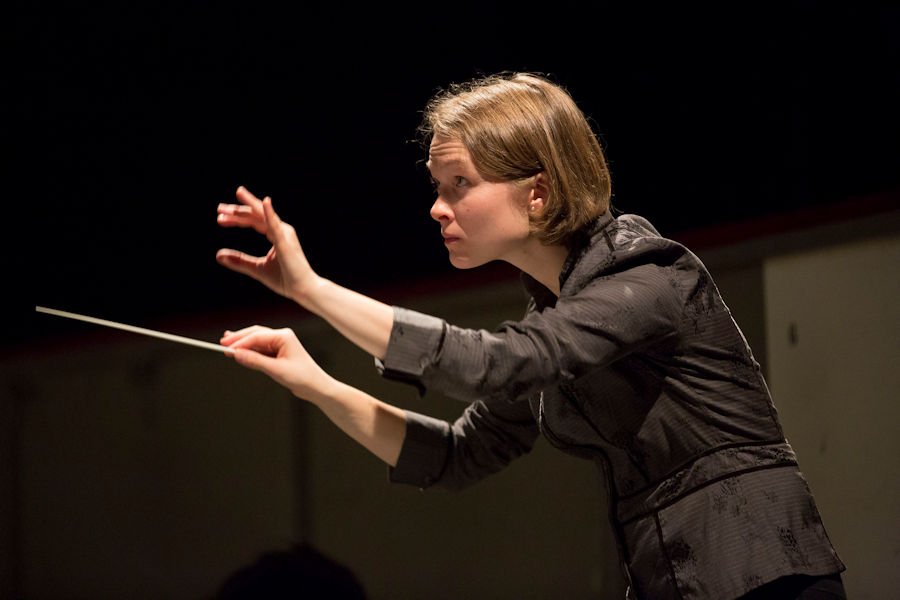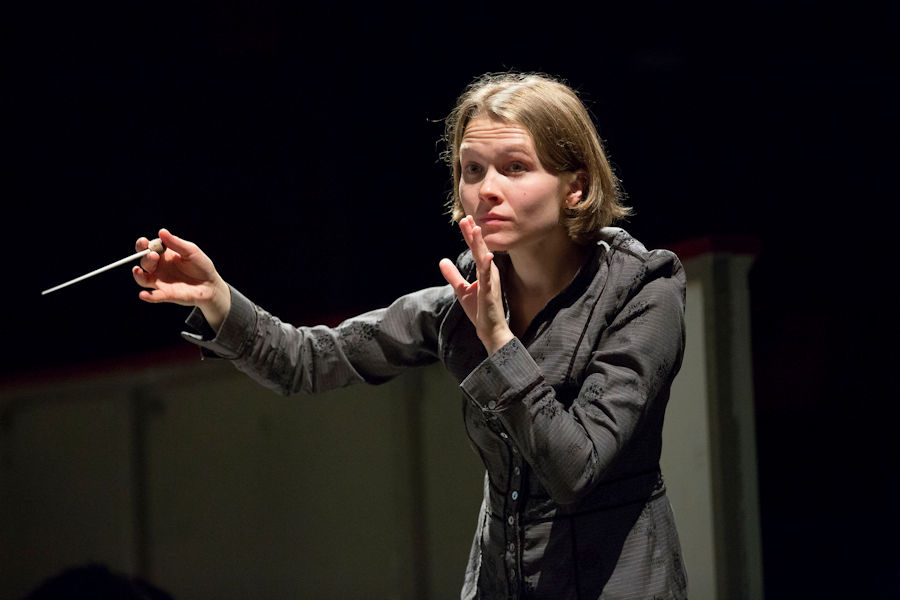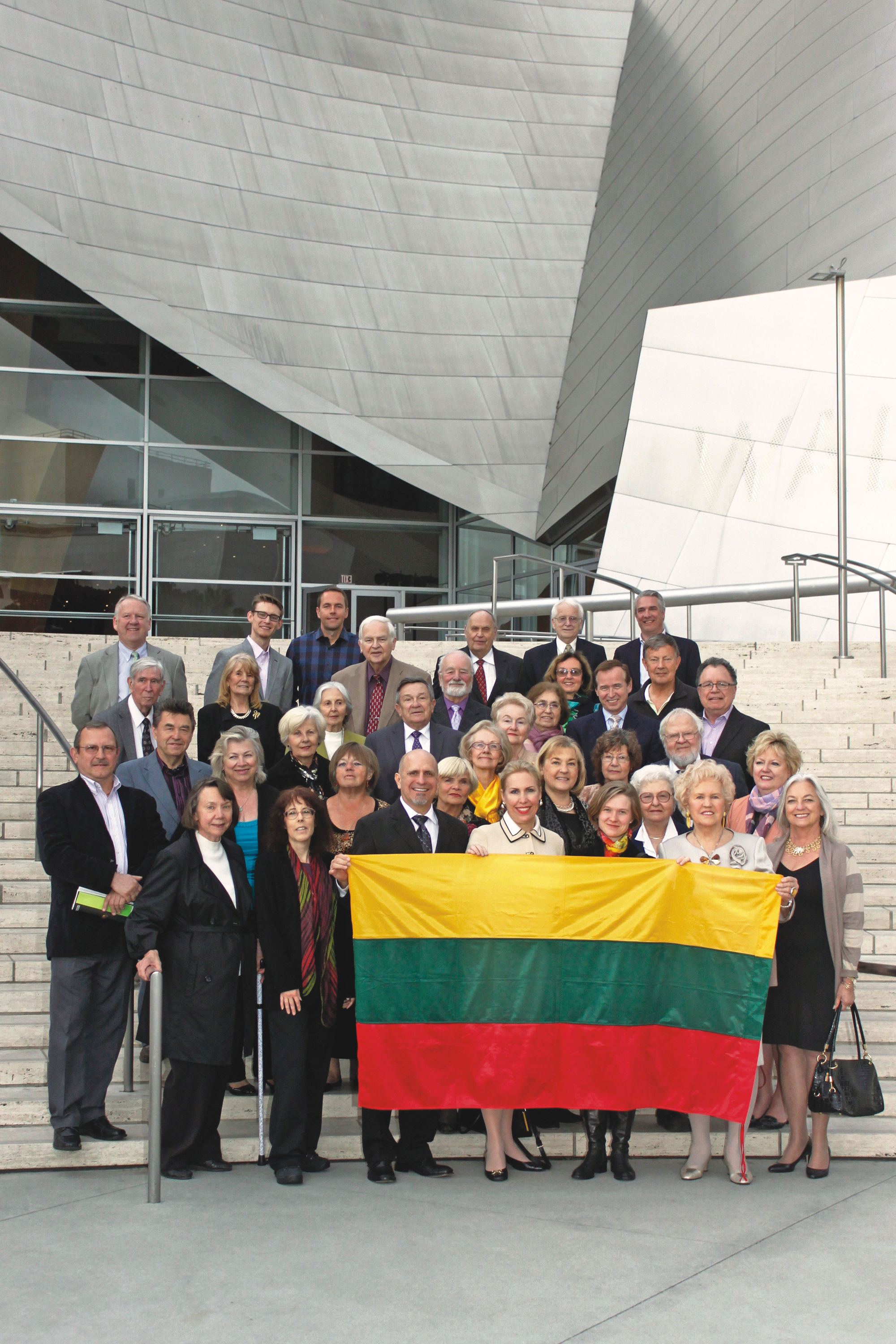An Interview with Mirga Gražinytė-Tyla, Los Angeles’ New Assistant Conductor
In 2014, The Los Angeles Times wrote, “Conductor Mirga Gražinytė-Tyla is already creating a stir in the classical music world for her buoyant podium style and intense approach to demanding symphonic works.”
Mark Swed of the LA Times commented after her first LA concert, “She manipulates sounds like a sorcerer. Agree with her or not, she’s on top of everything every second and clearly thrilled to be so,” while after the March 1, 2015, concert he proclaimed, “Mirga mania can now officially begin.”
 Vilnius-native Mirga Gražinytė-Tyla was born into a musical family and showed an early predilection to singing. She graduated with a Bachelor’s degree in choral and orchestral conducting from the University of Music and Fine Arts in Graz, Austria, and then decided to concentrate wholly on the orchestra, pursuing her studies at the Music Conservatory in Zurich, Switzerland. In 2012 Ms. Gražinytė-Tyla was the winner of the prestigious Nestlé and Salzburg Festival Young Conductors award, an honor that opened doors to numerous conducting opportunities, one of which was a perk of the award — the chance to conduct the Mahler Chamber Orchestra in a symphonic concert at the Salzburger Festpiele. She has collaborated with Gidon Kremer and Kremerata Baltica, made her debut with the Wiener Kammerorchester in Vienna, and in 2013/14 was First Kappellmeister of the Opera House in Bern, Switzerland.
Vilnius-native Mirga Gražinytė-Tyla was born into a musical family and showed an early predilection to singing. She graduated with a Bachelor’s degree in choral and orchestral conducting from the University of Music and Fine Arts in Graz, Austria, and then decided to concentrate wholly on the orchestra, pursuing her studies at the Music Conservatory in Zurich, Switzerland. In 2012 Ms. Gražinytė-Tyla was the winner of the prestigious Nestlé and Salzburg Festival Young Conductors award, an honor that opened doors to numerous conducting opportunities, one of which was a perk of the award — the chance to conduct the Mahler Chamber Orchestra in a symphonic concert at the Salzburger Festpiele. She has collaborated with Gidon Kremer and Kremerata Baltica, made her debut with the Wiener Kammerorchester in Vienna, and in 2013/14 was First Kappellmeister of the Opera House in Bern, Switzerland.
The Salzburg Young Conductor’s award came to the attention of the LA Philharmonic’s Music Director Gustavo Dudamel, who selected Mirga Gražinytė-Tyla as one the the orchestra’s Dudamel Fellows in 2013. He commented on the orchestra website, “When Mirga won the Salzburg Festival Young Conductors Award in 2012, I heard from many friends about this extraordinary talent from Lithuania. We invited her to Los Angeles under our conducting fellowship program and she impressed me, my colleagues in the orchestra, and everyone she came into contact with.”
In 2014 Mirga was offered the position of Assistant Conductor of the Los Angeles Philharmonic for two consecutive seasons. New offers keep rolling in: she was most recently appointed Music Director of the Salzburg Landestheater with the start of the 2015/16 season.
In between rehearsals for her March 1st concert, Mirga Gražinytė-Tyla graciously agreed to discuss her life and work with Draugas News correspondent Alexandra Kudukis.
Mirga, in 2014, you were appointed Assistant Conductor of the Los Angeles Philharmonic Orchestra. Was this a surprise for you?
The surprise was far greater in 2013, when I was invited as a Dudamel Fellow for a five-week engagement. It was a wonderful first experience and first collaboration with the orchestra. A couple of months later, after I had returned to Europe, I was offered the post of Assistant Conductor. I couldn’t accept the position immediately because I was engaged with the Opera House in Bern, Switzerland. So, I had to defer the opportunity for a year.
You are not yet 30 years old, yet you have accomplished so much! How do you handle this?
You know, it’s a great joy to encounter such an orchestra. I’m grateful and happy that I have received such a gift. But then, sometimes I wake up in the morning with a fright — do I really know what I’m doing? After rehearsals I think: these musicians are incredible, what can I offer them? In every person’s life there are highs and lows. I worry that I don’t know enough.
When I work with an amateur or a youth orchestra, it sometimes starts out very slow. Often times the musicians are unfamiliar with the piece, everything is off. But there are many rehearsals. You work at it and work at it, and in the end, you are so gratified that collectively you have created a symphony worthy of professionals. The path from the first rehearsal to the final performance is long, even for professionals. The further you go, the more difficult it is to stop. I have become convinced that the most important thing is the process, always moving forward, not stopping, not resting on one’s laurels. There is no respite from driving toward perfection.
I watched a short video of you from 1996 on YouTube. You were a contestant in the “Song of Songs” competition on Lithuanian television. I believe you were in the fourth grade. You seemed so self-composed, standing in front of the audience with the orchestra behind you. You sang a song “Gera būtų” (It would be good to be)…
That was a poem by Sigitas Geda put to music by Anatolijus Šenderovas. It’s a beautiful song. I am grateful to my parents for preparing me to sing in that contest. I recall that there were disagreements at home. I didn’t want to participate, while my parents kept trying to convince me. But our biggest disagreements were over acting. My parents, especially my father, thought that this song required that I act the part of the character. In the beginning the character is asleep, she gradually wakes, and then she puts up a fuss. My father came up with the moves. I fought him from the very beginning. “Who needs this?” I said. But in the end it turned out to be lots of fun.
Is that when you understood that you belong on the stage?
No, I did not have that desire then. I remember having the jitters before going on. Those were difficult minutes. But once I stepped on the stage, I felt fine. I just did what I had to do. I do remember that I decided to dedicate my life to music at the age of eleven. Up until then, I did not study music. I neither played an instrument, nor did I take any type of music classes. It seems that my parents did not want to make a musician out of me. But because both of my parents were musicians, everything at home was affected by music. I thought to myself, that if I don’t become a musician, I will be separated from life and my family. My parents were resolute to give their child a practical start in life, some pragmatic specialty that would give her a sound basis on which to stand. That is what they planned, but that is not the way it turned out.
You studied in Graz, Leipzig and Zurich. When did your love of singing turn to conducting?
 It was an evolution. As you aptly put it, my love grew and continues to grow. My decision to turn toward orchestral conducting started when I was studying in Graz, Austria. Until that time I was into vocal music. One professor, an opera conductor, for whom I had to play opera scales on the fortepiano and sing, kept asking me: wouldn’t I rather study orchestral conducting? That, I thought, seemed so remote. I’d say, “no that isn’t my specialty.” But that seed, once planted, began to grow, until I finally agreed to give it a try in addition to vocal music.
It was an evolution. As you aptly put it, my love grew and continues to grow. My decision to turn toward orchestral conducting started when I was studying in Graz, Austria. Until that time I was into vocal music. One professor, an opera conductor, for whom I had to play opera scales on the fortepiano and sing, kept asking me: wouldn’t I rather study orchestral conducting? That, I thought, seemed so remote. I’d say, “no that isn’t my specialty.” But that seed, once planted, began to grow, until I finally agreed to give it a try in addition to vocal music.
After I completed my BA I had to choose whether to pursue both singing and conducting or just one. I decided on the latter.
In 2012 you won the much coveted Nestlé and Salzburg Young Conductors Competition. You were selected from 91 candidates. How did you feel having bested so many talented young conductors?
I’ll be very frank. It’s an amazing award. It is very prestigious and it opened up many opportunities for me. That is a fact. But we shouldn’t exaggerate things. First of all, although there were 91 candidates, I did not see any of them, so it didn’t feel like a competition. They were seen only by the jury committee, to whom the candidates sent their applications and performance tapes. That is how conducting competitions are usually held. We also had to write an essay on what motivates us and our conception of conducting. Three finalists were selected from the pool of candidates. The winner of the award conducts a concert at the Salzburg Festival the following year. This is very difficult. The Festival is attended by very important people, world-class artists and performers, and many journalists. I rehearsed with the Gustav Mahler Youth Orchestra three times per day and in between rehearsals gave countless interviews. It was indeed very difficult work. The award gave me so much, but then again… there are two sides to a coin.
I noticed that you spoke flawless German with the journalists. Where did you learn the language?
When I began my studies I lived with a family in Austria for two years, and over the last ten years I have been living in German-speaking countries: Austria, Germany, and Switzerland. I also lived in Italy for about a year. I was immersed in the language. I speak German quite freely now, so I’m looking for opportunities to improve my English and at the same time not neglect my native language, Lithuanian.
My mother’s friends in Cleveland, OH greatly admire Maestro Dudamel. They say he is more than a conductor. While others might conduct mechanically, Gustavo Dudamel conducts from the heart, giving his entire soul. What impressed you most working with him?
It is his passion with which he does everything, as you say, giving his entire soul, that is impressive. Whenever he is in town the air is electrified. I think that he has been greatly affected by the environment in which he grew up – Venezuela. Together with Deborah Borda (President of the Los Angeles Philharmonic), he founded Youth Orchestra of Los Angeles (YOLA) according to the El Sistemos model. He is whole-heartedly dedicated to music and to making it accessible to all audiences. He wants children to learn to appreciate music and to experience the miracles that it provides. I greatly admire his character and work.
If you were to choose your favorite composer, who would it be?
It is probably impossible to choose one. It is usually the composer of the piece that I am working on at any given moment, because it is that piece into which I am pouring my heart and soul. Sometimes the process is easy, sometimes more difficult. Sometimes, as I work on a piece, I feel that it is not the best piece of music, but then I know I must work harder to discover its beauty. I still need to learn and experience a great deal. Only after I have had the opportunity of seeing the entire musical horizon will I be able to decide “here is my home, this is where I feel the best.”
Are you interested in introducing Lithuanian composers to American audiences?
O yes! I have done that in Europe, whenever I have had the opportunity. Take, for example, one of Lithuania’s rising young composers, Raminta Šerkšnytė. A few years ago she was commissioned by Mariss Jansons, another great maestro, to compose a piece to be performed before Beethoven’s compositions. It was called “Ugnys” (Fires). It was performed several times in Lithuania and then just recently in Augsburg, Germany, by the Deutsche Staatsphilharmonie Orchestra of Ludwigshafen. We performed B. Kutavičius’ “The Gates of Jerusalem” in Salzburg. The Munich Radio Choir performed Vasiliauskaitė’s “Canticle of the Sun” that was inspired by the works of St. Francis. It was a great experience. I’m looking forward to such opportunities in the United States.
How do Lithuanian, German and American musical cultures differ?
Every country has its own climate, its own natural resources, and its own music system. Each country also has its own conducting traditions. In Lithuania they joke that every other resident is a choirmaster. In fact, Lithuania does have a wonderful educational system that produces many choir leaders. Most of our orchestra conductors are former choir leaders. In clichéd terms, that’s the Lithuanian road to becoming a conductor. In Germany, Austria and Switzerland, orchestra conductors come up through the theater or the opera. They begin by accompanying singers at the piano, then playing for rehearsals. In such a way they become acquainted with the works of operatic repertoire. In Italy it is again different: there they study composition. Only after mastering composition can one begin to study orchestral conducting. In America you have assistantships. There are some conductor assistant positions in Europe, but that is not the standard, while in the US almost every orchestra conductor has an assistant. Sometimes the assistant works for three or more years with the orchestra, other times it’s only a few weeks. In German-speaking countries there are many theaters, and the arts are strongly supported by the state.
Where do you call home?
In 2011, I started working at the Heidelberg Opera House, and this now is my base-camp. I have an apartment there. Besides my home in Lithuania, I have Heidelberg. Heidelberg’s population is similar to Vilnius, perhaps a bit less. Heidelberg has its own opera house and an orchestra of about 60 musicians (half of the Los Angeles Philharmonic). About 20 kilometers from Heidelberg is Mannheim, which has a huge orchestra of about 100 musicians and a large opera house. About 20 minutes away from Heidelberg in the other direction is Ludwigshafen, which also has a large orchestra. Frankfurt, a major cultural center, is about an hour away. It is gratifying that all of these groups are supported by the state, and opera houses employ many musicians.
As a conductor, do you face any particular challenges because you are a woman?
I hear this question often. I would have to say no. But it would be more appropriate to pose this question to musicians who can assess what it means to work for a woman or a man.
What are your plans for the future?
I hope to continue to tread along this difficult path. Where it will take me, I do not know.


No comments yet.
Add your comment